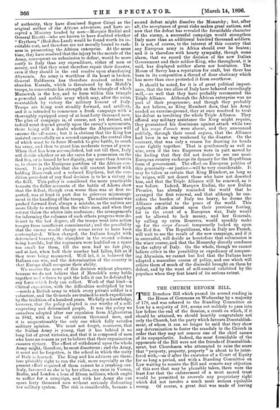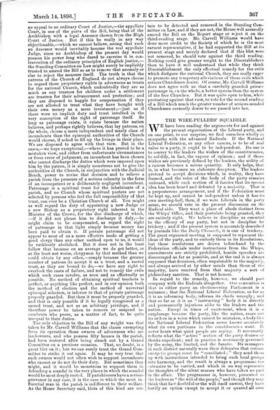THE CHURCH REFORM BILL. T HE Benefices Bill which passed its
second reading in the House of Commons on Wednesday by a majority of 178, and was referred to the Standing Committee on Law by a majority of 201, seems not unlikely to pass into law before the end of the Session, a result on which, if it should be attained, we should heartily congratulate not only the Church, but the party which favours Disestablish- ment, of whom it can no longer be said that they show any determination to foster the scandals in the Church in order that they may not remove one of the chief causes of its unpopularity. Indeed, the most formidable of the opponents of the Bill were not the friends of Disestablish- ment, but Churchmen who attempted to raise the scare that "property, property, property" is about to be inter- fered with,—as if after the existence of a Court of Equity for so long a period, and with a Standing Committee on Law waiting to receive the Bill and remove any objection of this sort that may be plausibly taken, there were the least fear that the enforcement of a most sacred trust would be permitted to overrule any proprietary right which did not involve a much more serious equitable wrong. Of course, a great deal was made of leaving no appeal to an ordinary Court of Justice,—the appellate Court, in one of the parts of the Bill, being that of the Archbishop with a legal Assessor chosen from the High Court of Justice. But if this be really in any way objectionable,—which we cannot believe, seeing that such an Assessor would inevitably become the real appellate Judge, since no Archbishop of the present day would
i
possess his power long who dared to exercise it n con- travention of the ordinary principles of English justice,— the Standing Committee on Law might surely be implicitly trusted to amend the Bill so as to remove that anomaly or else to reject the measure itself. The truth is that the patrons of the Church of England do not always choose to regard these proprietary rights in advowsons as trusts for the national Church, which undoubtedly they are as much as any trustees for children under a settlement are trustees for their advancement and protection ; and they are disposed to haggle for compensation if they are not allowed to treat what they have bought with their own money as a mere investment ;—just as if there were no implicit duty and trust involved in the very conception of the right of patronage itself. So long as patronage exists, it exists because the nation believes, and perhaps rightly believes, that lay patrons, on the whole, choose a more independent and manly class of incumbents than the episcopal authorities of the Church would choose, if asked to fill up the livings in their place. We are disposed to agree with that view. But in the cases,—we hope exceptional,—where it has proved to be a mistaken view, and either from unfortunate circumstances or from error of judgment, an incumbent has been chosen who cannot discharge the duties which were imposed upon him by the patron, it is simply monstrous not to give the authorities of the Church, in conjunction with the Judicial Bench, power to revise that decision and to relieve a parish from the pressure of a serious calamity in the form of an incompetent or a deliberately negligent incumbent. Patronage is a spiritual trust for the inhabitants of a parish, and no Church whose spiritual pastors are not selected by persons who feel the full responsibility of that trust, can ever be a Christian Church at all. You might as well regard the duty of appointing a new Judge or a new Bishop as a proprietary right inherent in the Minister of the Crown, for the due discharge of which, —if it did not please him to discharge it duly,—he might claim to be compensated, as regard the right of patronage in that light simply because money has been paid to obtain it. If private patronage did not appear to most of us a more effective mode of getting a good clergy than any other method open to us, it would be ruthlessly abolished. But it does not in the least follow that because on an average we do get better, or at the least not worse, clergymen by that method than we could obtain by any other,—simply because the greater number of patrons do accept it as a trust, and a sacred trust, as they are bound to do,—we have any right to overlook the cases of failure, and not to remedy the evils which such cases involve, as soon and as effectually as possible. No method of obtaining spiritual teachers is perfect, or anything like perfect, and in our opinion both the method of election and the method of universal episcopal selection, is inferior to that of private patronage properly guarded. But then it must be properly guarded, and that is only possible if it be legally recognised as a sacred trust, and not as an arbitrary privilege, and if therefore power be taken to remove or suspend in- cumbents who prove, as a matter of fact, to be quite unequal to their duties.
The only objection to the Bill of any weight was that taken by Mr. Carvell Williams that the clause exempting from its operation those owners of advowsons who are landowners, and who possess fifty houses in the parish, had been restored after being struck out by a Grand Committee on a previous occasion. That, no doubt, is a great blot on it ; but we can surely trust the Grand Com- mittee to strike it out again. It may be very true that such owners would not often wish to support incumbents who cannot or do not do their duty. But sometimes they might, and it would be monstrous to support them in defending a scandal in the very places in which the scandal would be most deeply rooted. If parishioners have a serious grievance in any case, it is the case in which the most in- fluential man in the parish is indifferent to their welfare. As the Home Secretary said, blots of this kind are cer- taM to be detected and removed in the Standing Com- mittee on Law, and if they are not, the House will assuredly amend the Bill on the Report stage or reject it on the third-reading stage. Mr. Carvell Williams would have done more credit to the Society of which he is the most earnest representative, if he had supported the Bill at its present stage and merely declared that if this blot were not removed, he should vote against the third reading. Nothing could give greater weight to the Disestablishers than to have it well understood that while they think Disestablishment the only effectual remedy for the evils which disfigure the national Church, they are really eager to promote any temporary alleviations of those evils which serious Churchmen desire. Of course, Mr. Carrell Williams does not agree with us that a carefully guarded private patronage is, en the whole, a better system than the system of the free Churches. But it was quite open to him, while protesting against that view, to vote for the second reading of a Bill which much the greater number of serious-minded Churchmen earnestly desire to see passed into law.







































 Previous page
Previous page